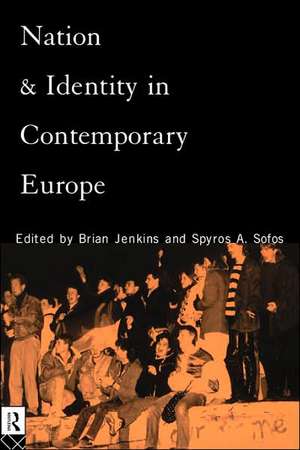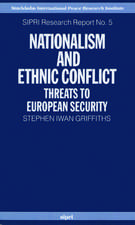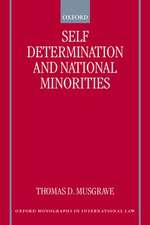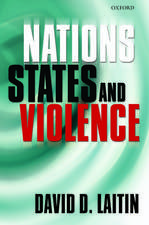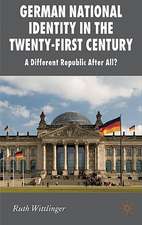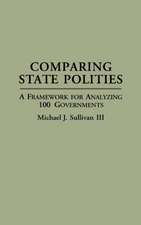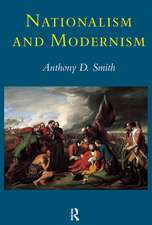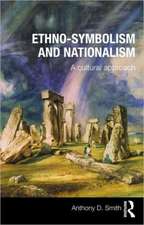Nation and Identity in Contemporary Europe
Editat de Brian Jenkins, Spyros A. Sofosen Limba Engleză Paperback – 11 iul 1996
Nation and Identity in Contemporary Europe takes a fully interdisciplinary and comparative approach to the 'national question'. Individual chapters consider the specifics of national identity in France, Germany, Britain, Italy, Iberia, Russia, the former Yugoslavla and Poland, while looking also at external forces such as economic globalisation, European supranationalism, and the end of the Cold War.
Setting current issues and conflicts in their broad historical context, the book reaffirms that 'nations' are not 'natural' phenomena but 'constructed' forms of social identity whose future will be determined in the social arena.
| Toate formatele și edițiile | Preț | Express |
|---|---|---|
| Paperback (1) | 369.73 lei 6-8 săpt. | |
| Taylor & Francis – 11 iul 1996 | 369.73 lei 6-8 săpt. | |
| Hardback (1) | 1116.94 lei 6-8 săpt. | |
| Taylor & Francis – 11 iul 1996 | 1116.94 lei 6-8 săpt. |
Preț: 369.73 lei
Nou
Puncte Express: 555
Preț estimativ în valută:
70.76€ • 76.83$ • 59.44£
70.76€ • 76.83$ • 59.44£
Carte tipărită la comandă
Livrare economică 22 aprilie-06 mai
Preluare comenzi: 021 569.72.76
Specificații
ISBN-13: 9780415123136
ISBN-10: 0415123135
Pagini: 308
Dimensiuni: 156 x 234 x 22 mm
Greutate: 0.45 kg
Ediția:New.
Editura: Taylor & Francis
Colecția Routledge
Locul publicării:Oxford, United Kingdom
ISBN-10: 0415123135
Pagini: 308
Dimensiuni: 156 x 234 x 22 mm
Greutate: 0.45 kg
Ediția:New.
Editura: Taylor & Francis
Colecția Routledge
Locul publicării:Oxford, United Kingdom
Recenzii
'Required reading for all politicians, journalists and organizations whose work involves coming to terms with the strength and complexity of nationalism, racism and ethnicity in the new Europe ... An essential addition to the reading list of any course which deals with these topics.' - Roger Griffin, Oxford Brookes University
'In sum Nation and Identity in Contemporary Europe can be viewed as a successful interdisciplinary treatment of a highly topical issue. The explanations are successful and each single article conveys well-founded knowledge.' - Dorle Drackle, Nationa and Nationalism, Volume 3
'...the broad overview of historical traditions of national identities in Europe assembled here especially with a view to the section on Eastern Europe makes it worthwhile introductory reading.' - Imke Sturm, Humboldt University, Berlin
Nation and Identity in Contemporary Europe provides the reader with a detailed and intriguing overview of the role(s) of nationalism in Europe and the issues that will continue to stoke the fires of nationalism into the twenty-first century. Readers should certainly look for further volumes of this series and include this one on their shelves.' - Erich Frankland, University of Oklahoma.
'In sum Nation and Identity in Contemporary Europe can be viewed as a successful interdisciplinary treatment of a highly topical issue. The explanations are successful and each single article conveys well-founded knowledge.' - Dorle Drackle, Nationa and Nationalism, Volume 3
'...the broad overview of historical traditions of national identities in Europe assembled here especially with a view to the section on Eastern Europe makes it worthwhile introductory reading.' - Imke Sturm, Humboldt University, Berlin
Nation and Identity in Contemporary Europe provides the reader with a detailed and intriguing overview of the role(s) of nationalism in Europe and the issues that will continue to stoke the fires of nationalism into the twenty-first century. Readers should certainly look for further volumes of this series and include this one on their shelves.' - Erich Frankland, University of Oklahoma.
Cuprins
1. Introduction, 2. Nation and Nationalism in Europe: A Theoretical Perspective, 3. The Language of Racism in Contemporary Europe, 4. Race, Nation and Identity in Fortress Europe, 5. Reconsidering 'Britishness': The Construction and Significance of National Identity in Twentieth Century Britain, 6. Nation, Nationalism and National Identity in France, 7. Post-War National Identity in Germany, 8. Italian National Identity and the Failure of Regionalism, 9. Multiple National Identities, Immigration and Racism in Spain and Portugal, 10. The Failure of Nationalism in Post-Communist Poland 1989-95: An Historical Perspective, 11. Nationalism and National Identity in Russia, 12. Politics, Culture and National Identity in former Yugoslavia, 13. Conclusion.
Descriere
Considering the question of why nationalism retains political significance when the nation state seems to be 'in decline', this volume offers a rich analysis of the 'national question' in nine major European countries.
